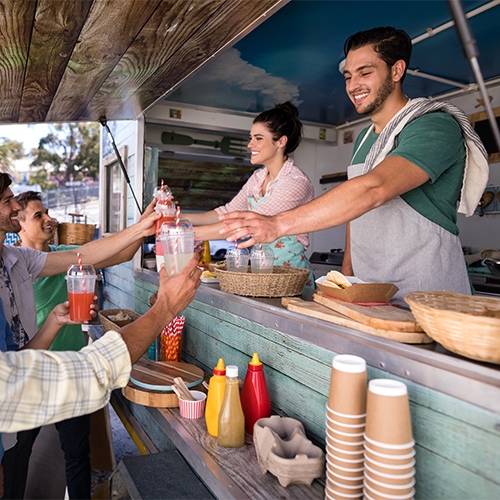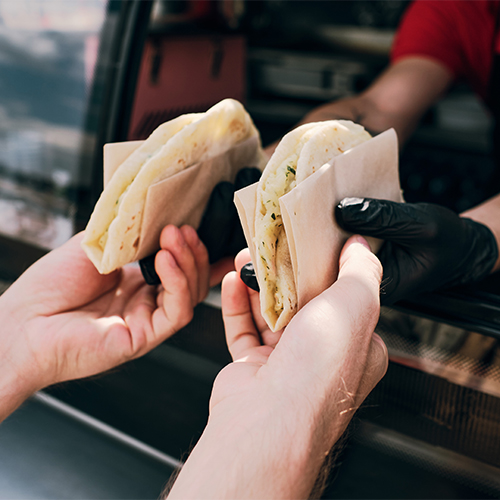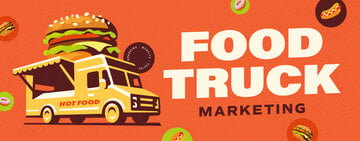How Food Trucks Can Save on Fuel Cost
The idea of starting a food truck is a potentially lucrative one, but many people are deterred by the fuel costs. Food trucks and their equipment use a lot of gas, making fuel a key expense of the business. Thankfully, even when gas prices are high, there are ways you can lower your spending on gas and maximize the efficiency of the fuel you purchase for your food truck. Below we’ll cover everything you can do to save on your food truck's fuel cost.
How to Save Money on Gas
Even when gas prices are high, there are several tips and tricks you can employ to save money on fuel. Just by being smart and taking advantage of trends, you can reduce the amount of money you spend on fueling up your food truck. Here are some of the most common methods of saving money on food truck fuel:
1. Compare Prices
Before buying gas, you should always compare gas prices from several locations in your immediate area. There are several third-party applications like GasBuddy that compare gas prices for you, making this an easy task. Do some research before you make your purchase, and you should be able to find some amazing deals on gas.
2. Loyalty Programs
Many gas stations have some sort of loyalty program you can take advantage of. One of the most common types of gas station loyalty programs is the punch card, giving you free or discounted fuel after a certain number of purchases. This is a great option to save money on gas if you’re limited in the gas stations in the area, or if you find that one specific location frequently has the best deals.
3. Rewards Card
There are several great cards that provide special rewards when used to purchase gas. These rewards include a cashback percentage and discounted prices. Just be sure your rewards card is saving you money, as some gas stations charge an extra fee for paying with cards. Some cards also have annual fees or interest charges that might offset any savings you gain on gas prices.
4. Avoid Premium

If your food truck doesn’t require premium gas, then you can save a lot of money switching over to regular fuel. Using premium fuel has a lot of benefits, including better engine performance. However, premium fuel isn't necessary unless stated and costs more than regular fuel. The extra costs add up quickly, especially if you’re refilling your vehicle often.
5. Pay with Cash
Many gas stations offer a discount when paying with cash to avoid paying processing fees on card purchases. For this reason, if you’re not utilizing a gas rewards card, you’ll be better off paying for your gas in cash.
5. Fill Up Early
Gas prices fluctuate daily, but there are some price trends you can take advantage of. On average, gas is the cheapest on Mondays. For this reason, to maximize the amount of money you save on gas, fill up early in the week.
How to Save Gas
Another method of spending less on gas is reducing the amount of fuel you use throughout the day. Rather than trying to lower the price of gas, these tips aim to reduce the number of times you have to refuel. When combining these tips with ways to save money on gas, you can reduce the amount of money you spend on refueling your food truck by a large margin. To get the most out of your food truck’s gas mileage, here are some methods to conserve fuel throughout the day:
1. Avoid Speeding
Although it may be tempting to speed up your pace to get to locations faster, speeding lowers your fuel efficiency. Fast speeds will burn more fuel on average, causing you to have to fuel up more often. Additionally, rapidly accelerating lowers your vehicle's fuel efficiency. If you want to limit the number of times you have to visit the gas station, be weary of your speeds and their effect on fuel efficiency.
2. Take Efficient Routes

Before you begin driving your food truck for the day, you should plan out the routes you plan to drive along. Many times operators waste gas by aimlessly driving around or by taking inefficient routes that add several minutes to your driving. Plan the most efficient routes that require the least amount of driving, allowing you to conserve more gas.
3. Check Tire Pressure
Many people don’t routinely check their tire pressure, but low pressure reduces your vehicle’s fuel efficiency. The more underinflated your tires are, the less efficient your fuel economy will be. Ensure you’re routinely checking your tires, as you don’t want to have to fill up more just because you don’t maintain them.
4. Avoid Idling
You might not think that your food truck uses a lot of gas while idling, but the costs add up over time. Over the course of the year, you can lose gallons of fuel to idling, forcing you to refuel more and spend more money on gas. If you find yourself stuck in traffic or in a similar situation, it's best to turn your engine off and conserve fuel.
5. Maintain Your Vehicle
If you want to limit the number of times you need to refill, you should ensure that your vehicle is properly maintained. Engine problems are one of the biggest detriments to gas mileage, so it’s important that it's always running smoothly. Maintaining your engine will make your vehicle run smoother and last longer, allowing you to get maximum value out of it.
6. Simplify Your Menu

Many food truck operators have complex menus that require many different pieces of equipment to prepare. Simplifying your menu so that it can be prepared on one or two pieces of equipment allows you to lessen the amount of equipment you need to power with your generator. Less food truck equipment means less energy used, allowing you to save on gas.
7. Limit Air Conditioner Use
Air conditioning is a huge blessing during the hot summer months, but utilizing it in your food truck lowers the vehicle's fuel efficiency. The less you use your air conditioning, the more fuel you’ll save. While this doesn’t mean you need to suffer all summer with no AC, you should be more conservative with how often you utilize it.
Gas vs Diesel
One of the biggest things that determine how much you spend on gas is whether you have a gas food truck or a diesel food truck. Diesel food trucks are often more expensive upfront, but, they are more fuel efficient and have higher durability than their counterpart. Over time a diesel engine may end up saving you money with its fuel efficiency.
On the other hand, gas engines have much less of a noticeable odor and run quieter, both things that are very important when serving customers from a food truck. Also, even though gas engines are less durable, repairing a gas engine will cost less on average than repairing a diesel engine. In the end, both types of food trucks have their pros and cons, so weigh out the advantages and disadvantages of gas vs diesel before buying a food truck.
Electric Food Trucks
An alternative to gas and diesel food trucks is electric food trucks, allowing you to completely bypass the need to refuel your food truck. Generally, it is much cheaper to charge an electric food truck than it is to refuel a gas food truck. Electric food trucks are also environmentally friendly and don't emit any odors like gas and diesel food truck do, so you don't have to worry about anything affecting your customers' experience.
Although electric food trucks save you money on gas, they are more expensive to purchase upfront. Over time the switch may be worth it, but initially, electric food trucks will cost you more money. Charging stations are also harder to find than gas stations, especially in more rural areas, limiting your options when you do need to charge up.
Food Truck Generators

Another major source of fuel consumption for food truck operators is the food truck generators that are required to run equipment when the food truck is parked. Ensuring that you're getting the most out of the fuel you put into your food truck generators is just as important as improving the fuel economy of the food truck itself. With that in mind, here are some tips to ensure your food truck generator is running as efficiently as possible:
Conservative Use
Using your generator conservatively is a great way to burn less fuel. Your generator should only be used when it's necessary to power equipment and should remain dormant when equipment is not being used. You may also want to look into adding an alternative energy source to lessen the load on your generator. For example, you could install solar panels on the roof of your food truck to capture sunlight and convert it into energy that powers the smaller pieces of equipment in your food truck.
Avoid Overloading
If you're overworking or overloading your generator, it will increase its fuel consumption by a large margin. Before you purchase your generator, you should analyze what the energy requirements for your food truck are going to be. You'll want to purchase a generator that has a capacity similar to these energy requirements, as overloading and underloading your food truck generator are two of the biggest culprits of wasting fuel.
Regular Maintenance
Just like with your food truck, performing regular maintenance on your generator can reduce its fuel consumption. When a generator is damaged or in need of repairs, it can cause the generator to use more power and fuel. Not only does regular maintenance increase your generator's fuel efficiency, but it also ensures you run into no complications with powering your food truck equipment
Saving on fuel costs is a key part of lowering your operating expenses as a food truck owner. By shopping smart and conserving fuel, you can not only spend less on gas but also reduce the number of times you have to refuel. Over time these fuel savings will add up, allowing you to reinvest the savings into improving even more aspects of your food truck.



